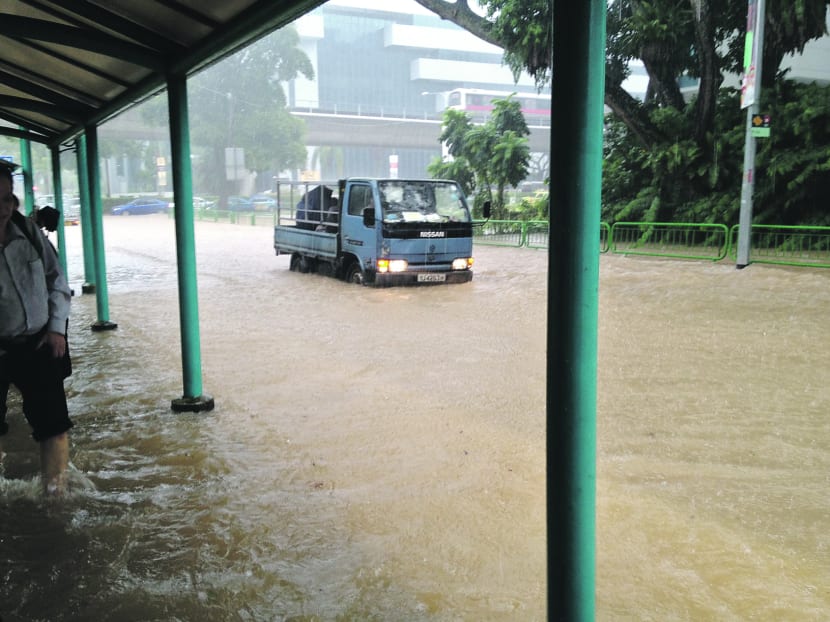Rising to the occasion
COPING WITH THE INEVITABLE

Tackling floods is about making radical change to infrastructure and expanding our drainage network. TODAY file photo
COPING WITH THE INEVITABLE
Vivian Chua: A flood prediction system typically has sensors to measure water levels at different areas around the island. The key to such monitoring systems is how we can transmit the information rapidly enough to the public so that they know not to go to places where there may be flooding.
Jose Raymond: If you follow Twitter and Facebook, I think there are many people out there putting up photos and videos about what is happening out there, and I think that is key to us coming together and finding a solution to how we can tackle all this. I don’t think people from the Government are going to be on the ground all the time, and I think citizens can play a part. If there is an area around your home which is constantly flooding every time there is rain, they should bring it up. If there is a safety issue, they need to inform the authorities.
Olivia Choong: I also think it would be useful to have more signs and indicators around Singapore when there is flooding, especially for drivers.
Vivian: (On the impact of climate change) We need to be clear that rising sea levels alone will not lead to more flooding — it is a rise in sea levels combined with greater intensity and frequency of storms that pose a greater risk of flooding. We are studying trends in the Asia-Pacific region. The main purpose of our work is to increase awareness of what is going to happen. If we do not study this at all, the Government is not going to be able to find solutions. From an academic perspective, this is basic research.
Chong Kee Sen: Very little is known about the impact of climate change, which is why we brought the World Engineers Summit to Singapore, to understand the potential impact and look for innovative mitigation solutions. The Building and Construction Authority is also looking at how to protect our shorelines from rising sea levels.
Olivia: I understand that there (will be) widening of canals, and barriers (are being built) ... (but apart from that) I think it is always worth looking at other technologies, even low technologies like storm water harvesting.
The National University of Singapore is also conducting research at the moment about permeable surfaces, like roads and tiles.
Jose: We need to get used to the fact that there will be recurring floods and we need to get used to that kind of life. There must be acceptance from employers and schools and we need to adapt. We also need to understand that we contribute to climate change and we need to take a look at ourselves to see what we can do differently. It is about adapting. If you think your business is vulnerable, take the necessary precautions, just like what businesses at Orchard have done. They need to take the proactive step and not rely on someone to be there for them when needed.
THINKING AHEAD
Peter Loon: It can be as basic as making sure people are aware that they should not throw litter into the drains, and having a citizens’ network so that we can keep each other informed. But it is also about making radical change to infrastructure and expanding our drainage network. I acknowledge that rain is a constant phenomenon, but we should be tackling it actively if it seems to be getting worse. This can be something as simple as upgrading and widening drains whenever we start new projects, to cater to more than what is needed now.
We do not want to wait until a fatality happens, and then react to that. (Flooding) affects our economy. When a major arterial road like the Ayer Rajah Expressway floods, it delays people who are getting to work. It is time we put in effort on a concerted level with many agencies to fix this. There are already areas being significantly affected, so we should be improving on the infrastructure and building them on a preventive basis, with the view that things might get worse.
Vivian Chua is an Assistant Professor from the National University of Singapore’s Department of Civil & Environmental Engineering.
Olivia Choong is the founder of Green Drinks Singapore, a non-profit promoting collaboration on environmental issues.
Chong Kee Sen is Vice-President of The Institution of Engineers Singapore.
Jose Raymond is Executive Director of the Singapore Environment Council.
Catch the one-hour extended encore telecast of this week’s VoicesTODAY episode “Floods: A natural or a man-made problem?” at 5.30pm today on Channel 5.






